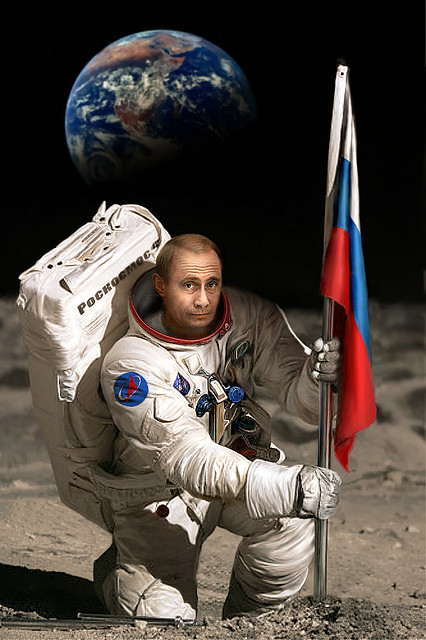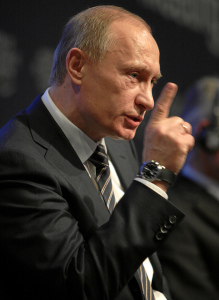Sanctioning Russia: Effective or Unnecessary?
 Flickr user Mark Rain. http://tinyurl.com/peysmkc
Flickr user Mark Rain. http://tinyurl.com/peysmkc
Earlier this year, following Russia’s annexing of Crimea and the recent increase in tensions following the transport of Russian military into Ukraine in November 2014, much of the developed world enforced sanctions against Russia, including Canada, the US, the EU, Australia, Japan and Norway. Sanctions imposed on Russia were initially political, restricting travel of officials and prominent figures in business. By the end of April further travel bans were initiated by the EU, and the US banned interactions with certain Russian companies and individuals. This was the beginning of the economic sanctions.
Sanctions were gradually extended by various nations during the summer of 2014, restricting imports from Crimea, limiting trade with a variety of energy companies, arms manufacturers, banks and individuals, including Gazprombank, the third largest Bank in Russia, Novatek, Russia’s largest gas producer after Gazprom, and Rosneft, an oil company majority-owned by the Russian Government. Sanctions also included freezing assets and halting plans for all infrastructure investments in Russia funded by Japan and the EU. Russian banks were prohibited from making certain loans and investments, arms exports were banned, and assistance to the Russian oil development sector was halted.
John Baird, Canada’s minister for foreign affairs, made a statement in September regarding the imposition of sanctions on Russia: “Those responsible for fanning the flames of conflict will continue to face increased pressure through targeted sanctions. The sanctions imposed in coordination with our other allies are without a doubt having an effect on the Russian economy. Canada stands prepared to move farther with our allies and partners to hold the Putin regime accountable.”
Following such statements, Russia responded by issuing their own reciprocal sanctions, and the Russian Foreign Ministry asserted: “Treating our country in such way, as Washington could have already ascertained, is inappropriate and counterproductive.” Russian sanctions have included the banning of certain public officials from entering Russia, and a one year embargo on imports from countries that have declared sanctions against Russia, targeting food exports from the US, EU, Norway, Canada and Australia. These sanctions on food exports are valued at over €13 billion.
At least six Russian companies have filed complaints at the European General Court seeking to overturn EU sanctions since early October. According to Mark Dubowitz, who lobbies for tougher sanctions on Iran at the of the Washington-based Foundation for Defense of Democracies, “courts rarely allow governments to present classified evidence under seal, which makes it hard to defend the use of sanctions”, which has resulted in European courts annulling Iranian sanctions. It is possible that although sanctions would continue during a case, following a victory, they would be annulled. Substantial financial damages could be recovered if they are able to prove that the Russian companies and banks were not affecting Russia’s actions in Ukraine, although the state does hold stakes in all of them.
It may transpire that sanctioned individuals can avoid European courts if they wish to seek compensation, following a bill read in the Russian Parliament in October 2014. The bill, known as the Rotenberg Law following the seizure of influential Russian businessman Arkady Rotenberg’s $40 million Italian villa, would allow individuals and companies targeted by sanctions to be compensated using frozen assets of foreign-owned companies operating in Russia, including McDonalds, Pepsi and ExxonMobil. The bill is yet to come into force, but the vote for adoption passed in the first stage of three.
Multinational companies threatened by the Rotenberg Law have thus far continued operations almost as usual, with a few McDonald’s locations being closed following “health concerns”, and Pepsi has actually had some improvements in sales of Russian national dairy products following Russia’s ban on food imports.
Cutting off key Russian industries from Western markets has led corporate giants with close ties to Putin to seek bailouts from state reserves. This is a classic case of a company operating under the premise of being too big to fail, making private profits but in times of hardship incurring publicly funded losses. Putin’s regime may begin to lose its legitimacy in the eyes of the Russian people if he acquiesces to such demands, but without helping the sanctioned companies, he may lose his loyal inner circle, members of which have been the main targets of the foreign sanctions.
Projected economic growth figures for Russia and the surrounding region have taken a turn for the worse, with sanctions undoubtedly affecting the Russian economy. The IMF’s October Report on Regional Economic Issues observed slowing economic growth in Central, Eastern and South Eastern Europe following geopolitical risks, revising down their projected growth rate for the region to 1.2% for 2014. The IMF revised forecasted growth rates in Russia to a mere 0.2% for 2014 from the previous 1.3% in 2014, and 0.5% for 2015. The report further notes exchange rate depreciation and high domestic food prices in Russia following a ban on many food imports, resulting in high inflation and negative net capital flows, with corporate bond issuance almost completely dried up. In addition, real export growth from Russia is projected to fall to -1.2% in 2014, compared to +4.3% in 2013, while the EU improves from 1.4% in 2013 to 3.4% in 2014. According to these IMF figures, Russia has been extremely hard hit by their sanctions, while the European area has incurred manageable losses.
The World Bank Russia Economic Report published in September 2014 supports the IMF’s stance, stating that Russia’s economy is stagnating following increased volatility and geopolitical tensions. They predict similarly dismal growth for the Russian economy, with the assumption that no additional sanctions are enforced. If additional sanctions are enforced, they predict that Russia will experience a recession with a -0.9% growth rate for 2015.
The World Bank explains that sanctions and counter sanctions have affected economies in three ways. Firstly, capital outflows resulted in increasingly volatile foreign exchange markets and depreciation of national currency, as well as high inflation. Secondly, reduced access to international financial markets meant the domestic cost of borrowing soared following liquidity constraints. Finally, further drops in consumer and investor confidence continue to worsen growth prospects.
Under normal market conditions, increased confidence in currency could reduce high inflation, and currency depreciations would increase competitiveness of domestic exports. Alternatively, increased foreign direct investment (FDI) could improve the economic outlook. In Russia’s case, typical market solutions have not occurred. For example, following reduced food imports one would expect the domestic supply of food to increase to meet demand, however in Russia the price of food is simply increasing. Another example would be that FDI is falling rather than increasing, following Russia’s foreign policy and the enforced sanctions.

The impacts in countries enforcing sanctions have also been significant. These have included negative spillovers of growth shocks in Central and Eastern Europe due to complete dependence on Russian gas supplies. Direct negative impacts of sanctions include losses for food exporters, and various corporate changes, including the cancellation of Microsoft’s plan to distribute free tablets in Russian schools.
Germany is one of the hardest hit nations by European sanctions as its economy is export-dependent. German exports to Russia in August 2014 were valued at €2.3 billion, a 26.3% decline from the value of exports in August 2013. Although Germany’s exports to Russia account for just 3% of Germany’s total production for export, falling trade volumes have lowered business confidence in Germany overall. Declines in exports are jeopardizing 25,000 German jobs following the sanctions, according to the German Committee on Eastern European Economic Relations. Adidas cut its revenue and profit targets for this year and scrapped them for next year, blaming a range of causes including exposure to a weak Russian market. However, manufacturing in central Europe began an upward trend in October following a three month contraction, possibly supplementing a fall in demand from Russia with increasing internal demand.
Given the context of the sanctions surrounding Russia’s invasion of Ukraine, Putin is evidently unpredictable and unreliable, thus enforcing sanctions against Russia is a risky endeavor. Russia’s response to sanctions has proven this point, responding with their own sanctions and threatening compensation using assets of foreign-owned companies in Russia. Although it is evident that Russia’s economy has been affected by these sanctions in the short and medium term, there is the possibility of replacing lost relationships with long term agreements with other nations, perhaps China. This would reduce economic impacts of sanctions in Russia, making sanctions on Russia increasingly less effective, but sustaining negative impacts of reduced trade in the EU, US, Canada, Australia and others.
The increased sanctions on Russia have taken considerable diplomatic focus and time. The response-on-response actions taken by Russia and the rest of the developed world have not been effective in changing Russia’s stance despite the possibility of Russia entering a recession, as we have seen the transport of Russian military and arms into Ukraine on November 12th, despite the ceasefire agreed in September 2014. The gradual expansion of sanctions has drained attention from the crux of the issue: Russia’s ongoing violation of sovereignty in Ukraine. In order to refocus the global community on the issue at hand, strict and coordinated global sanctions should be taken in order to increase impact, pushing Russia into a recession. This would force Putin into addressing domestic economic issues and would give the rest of the world an opportunity to focus on new strategies to respond to the increasing threats in Ukraine, which may require military intervention.
